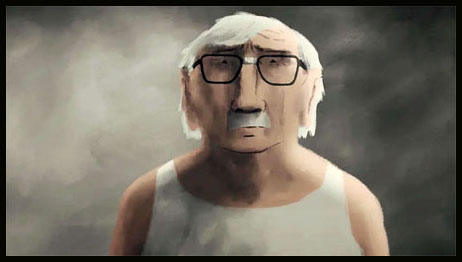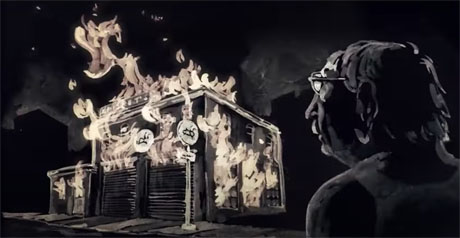Jared and Jerusha Hess, the duo behind Napoleon Dynamite and Nacho Libre, present their first-ever animated short film. The excellent Ninety-Five Senses stars Tim Blake Nelson as the voice of Coy, a man reflecting on all facets of his...

Jared and Jerusha Hess, the duo behind Napoleon Dynamite and Nacho Libre, present their first-ever animated short film. The excellent Ninety-Five Senses stars Tim Blake Nelson as the voice of Coy, a man reflecting on all facets of his life and body. The Hesses give me a taste of how this short came to be in this Animation Scoop Q&A. (This was conducted as an email interview and was edited for length and clarity.)
Jackson Murphy: How did you decide on the order of presenting the five senses in how you wanted to tell this story?
Jared & Jerusha Hess: The team gave a lot of thought to which sense was the best showcase for a given anecdote or vignette. The story really dictated it. The sight section shows how out of touch our main character (Coy) is with the modern world – all his griping about cell phones – but it also piques the viewer’s curiosity: “How is it that this adult man has never owned a cell phone? What’s his situation?” Smell is the sense most closely tied to memory, so we use that to begin his journey into the past. Hearing leads into the big reveal of the film: Coy’s hearing loss was responsible for an event that would prove to be his life’s great tragedy. Once we’re fully aware of his predicament – and his fate – it makes sense to talk about his last meal, and that’s where we get taste. Touch is what triggers Coy’s fantasy, and that’s how the film ends, with a vision of what his life could have been.

JM: What did you further discover about the power of our senses?
J&JH: We hope that when people watch the short, it renews their appreciation for their own senses. We were actually in production during the bleakest stretch of Covid, when everyone was losing their sense of smell. It made us realize how much less enjoyable life is without that ability – food tastes worse, you lose your appetite, it just drains the joy from so many things that make life worth living. So, that experience definitely informed our choices. One of our favorite reactions to the film was from a woman, the grandmother of a friend, who’s in the beginning stages of macular degeneration. She’s losing her eyesight. Our friend told us she got very emotional hearing Coy’s description of savoring his senses. She said it made her grateful for the sight she still has.
JM: What were your goals in wanting to showcase fun and painful detailed memories we have?
J&JH: Everyone’s life is, of course, a mixture of bitter and sweet. Reminiscing can be a joyful experience, but oftentimes you end up sort of wallowing in self-pity and guilt. We all have regrets. Ninety-Five Senses presents the remembrances of a man who’s led an extreme life. The main character’s monologue was based on real-life interviews with death-row inmates waiting to be executed – longform interviews that our writers, Chris Bowman and Hubbel Palmer, watched for hours and hours. These prisoners were remorseful about their crimes and very wistful…but there were also lighter moments, off-color jokes, discussions of mundane stuff like the prison mail system and their favorite game shows. We wanted the short to showcase the full spectrum of emotions. We pack a lot into 13 minutes.
JM: This is a challenging voice performance for Tim Blake Nelson, who pulls it off. How did the three of you invest yourselves in this material?
J&JH: Tim was such a pleasure to work with. So talented and big-hearted. Apart from his immediate connection to the material and its underlying message, he understood a couple things right away about the role: First, that we need him to be fairly sympathetic, start to finish. “Likable,” for lack of a better word. If he struck viewers as crass or mean, the film’s primary gut punch just wouldn’t land. He also knew that his monologue would be used to tie together six very different types of animation. We have these jarring stylistic shifts – watercolors, charcoal, 2D, printmaking techniques – and his performance had to smooth them out. So, his vocal approach had to be distinct; it couldn’t get lost in that visual shuffle. We feel like his Southern drawl provides the piece with a wonderful through line.

JM: This short is a celebration of different approaches to animation. What are some of your highlights of the visuals?
J&JH: We love the way each chapter came out. The animators worked so hard and really filtered the script through their own sensibilities. Daniel Bruson deserves recognition for designing the main character. Along with Tim’s vocal work, which we just mentioned, Daniel’s scenes give all these disparate sections a connectivity. They’re the film’s “home base.” Dallin Penman and Jared Mathews added so many fun details to their section (“Smell”): the VHS boxes in the video store, the grannies dragging on cigarettes under their hair dryers. Michael Grover’s “Hearing” section is basically one extended slow-zoom, which we thought was so clever. KC Tobey (“Taste”) intercuts between a fantasy restaurant and Coy’s harsh reality. Dominica Harrison and Scott McHenry went more abstract with “Sight.” Their image of teenagers diving like lemmings into their cell phone screens is a favorite. Gabriela Badillo and her team rendered the “Touch” section near the end, which is where most viewers cry, if they’re so inclined. Just phenomenal work from everyone. All credit to MAST – the non-profit media accelerator run by Miles David Romney and Tori A. Baker – for pulling this group together. They assembled an amazing collective.
JM: You present “looking at what life might’ve been like if different decisions were made” in such an honest way. How did you approach this?
J&JH: Multiverses are all the rage today, so maybe this is our take on that concept. A glimpse of an alternate reality. We were both brought up in religious households, where there was a lot of emphasis on life choices and consequences. But everybody, religious or not, ends up thinking like this at some point. Mostly in the context of regret. “What would it be like if I’d married Bill instead of Phil?” Or “What if I’d taken that scholarship?” We turn those things over in our heads. And again, Coy in Ninety-Five Senses has more profound regrets than most, so for him it’s a particularly tempting exercise.
JM: Do you truly believe cell phones are ruining our eyeballs?
J&JH: Haha. Well, our main character believes it, and he’s had plenty of time to read up on it.











